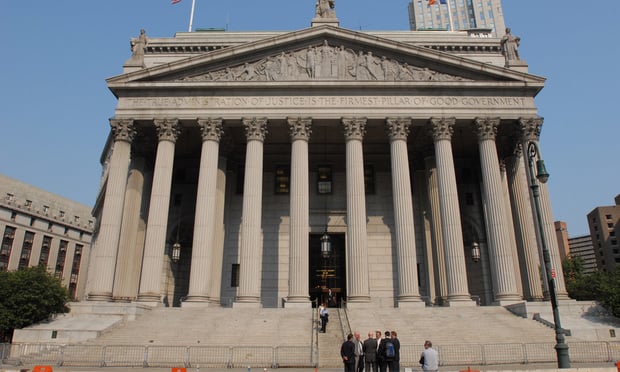Thomas J Hall

August 15, 2019 | New York Law Journal
Stays of State Court Securities Actions: A Changing Tide?It is common for defendants facing parallel securities class actions in New York state court and federal court to seek a stay of the state proceedings. Historically, New York state courts have readily deferred to their federal counterparts, agreeing to stay the state action pending the outcome of the federal action. Two recent Commercial Division cases, however, suggest this approach may be changing, increasing the risk that securities defendants will face active, concurrent litigation in both state and federal court. In their Commercial Division Update, Thomas J. Hall and Judith A. Archer explore these recent developments.
By Thomas J. Hall and Judith A. Archer
8 minute read

June 20, 2019 | New York Law Journal
Personal Jurisdiction Based on Electronic and Telephonic CommunicationIn their Commercial Division Update, Thomas J. Hall and Judith A. Archer write: With continued advances in technology, the personal jurisdiction analysis has continued to evolve, and courts are increasingly examining fact patterns with more remote physical contacts with New York. As a result, the personal jurisdiction analysis is becoming increasingly complicated and unpredictable.
By Thomas J. Hall and Judith A. Archer
9 minute read

April 18, 2019 | New York Law Journal
Pleading and Proving Unjust Enrichment ClaimsIn New York, the elements of an unjust enrichment claim are “that (1) the other party was enriched, (2) at that party's expense, and (3) that it is against equity and good conscience to permit the other party to retain what is sought to be recovered.” Several factors can drive the determination of whether these elements are adequately pleaded or later proven. In their Commercial Division Update, Thomas J. Hall and Judith A. Archer examine recent Commercial Division decisions addressing the application of these factors.
By Thomas J. Hall and Judith A. Archer
9 minute read

February 14, 2019 | New York Law Journal
Binding Nonsignatories to Arbitration AgreementsIn their Commercial Division Update, Thomas J. Hall and Judith A. Archer discuss recent cases which show the Commercial Division recognizes that circumstances may require binding nonsignatories to arbitration agreements. The direct benefit theory of estoppel and agency is the most frequent reason that demands for arbitration are granted against nonsignatories. Individuals and businesses would do well to be mindful of these theories when interacting with business partners and affiliates lest they find themselves in an unexpected arbitration.
By Thomas J. Hall and Judith A. Archer
9 minute read

December 20, 2018 | New York Law Journal
Use and Abuse of Confidentiality OrdersIn their Commercial Division Update, Thomas J. Hall and Judith A. Archer write: While confidentiality orders are valuable tools in protecting competitive and other sensitive information, they are subject to abuse. Aggressive or inattentive counsel can overdesignate those documents that are protected, adding burden and expense to the opposing party. Indeed, in a recent Commercial Division case, Google was sanctioned for just that. This decision sends a stern reminder to litigation counsel of the need to be well versed on the applicable rules and standards, which we address below.
By Thomas J. Hall and Judith A. Archer
9 minute read

October 16, 2018 | New York Law Journal
Judicial Dissolution of New York Limited Liability CompaniesIn this Commercial Division Update, Thomas J. Hall and Judith A. Archer write: '1545 Ocean Ave.' and its progeny have clarified the requirements for satisfying the “not reasonably practicable” standard of §702. While prior case law had typically avoided analysis of the meaning of this standard, the Commercial Division now applies consistent criteria to applications for judicial dissolution of LLCs, providing greater certainty to members who seek dissolution.
By Thomas J. Hall and Judith A. Archer
8 minute read
August 15, 2018 | New York Law Journal
Rule 3211(a)(1) Documentary Evidence in an Electronic AgeIn their Commercial Division Update column, Thomas J. Hall and Judith A. Archer address the New York Court of Appeals' recent decision evaluating documentary evidence consisting of emails and compatible correspondence.
By Thomas J. Hall and Judith A. Archer
8 minute read

June 14, 2018 | New York Law Journal
Fiduciary Duties Arising From Close Personal RelationshipsThis column addresses recent decisions out of the Commercial Division that target exactly that question, whether fiduciary duties may arise as a result of a close personal relationship between parties.
By Thomas J. Hall and Thomas R. Commons
1 minute read

April 19, 2018 | New York Law Journal
Judicial Approval of Disclosure-Only Class Action SettlementsIn his Commercial Division Update column, Thomas J. Hall discusses recent Commercial Division decisions applying a new standard for judicial approval of non-monetary class action settlements in New York.
By Thomas J. Hall
9 minute read

February 15, 2018 | New York Law Journal
Implied Partnerships and the Importance of Shared LossesIn his Commercial Division Update, Thomas J. Hall writes: When there is no enforceable partnership agreement, the party seeking to establish an implied partnership must show that a partnership nevertheless exists based on the conduct, intention and relationship between the parties. Although no one factor is determinative, recent Commercial Division decisions have placed a heightened emphasis on the factor of shared losses.
By Thomas J. Hall
8 minute read
Trending Stories
- 1Biden Has Few Ways to Protect His Environmental Legacy, Say Lawyers, Advocates
- 2UN Treaty Enacting Cybercrime Standards Likely to Face Headwinds in US, Other Countries
- 3Clark Hill Acquires L&E Boutique in Mexico City, Adding 5 Lawyers
- 46th Circuit Judges Spar Over Constitutionality of Ohio’s Ballot Initiative Procedures
- 5On The Move: Polsinelli Adds Health Care Litigator in Nashville, Ex-SEC Enforcer Joins BCLP in Atlanta
More from ALM
- Legal Speak at General Counsel Conference East 2024: Virginia Griffith, Director of Business Development at OutsideGC 1 minute read
- Legal Speak at General Counsel Conference East 2024: Bill Tanenbaum, Partner & Chair, AI & Data Law Practice Group at Moses Singer 1 minute read
- Legal Speak at General Counsel Conference East 2024: Julie Cantor, Associate General Counsel at Studs, Inc. 1 minute read



